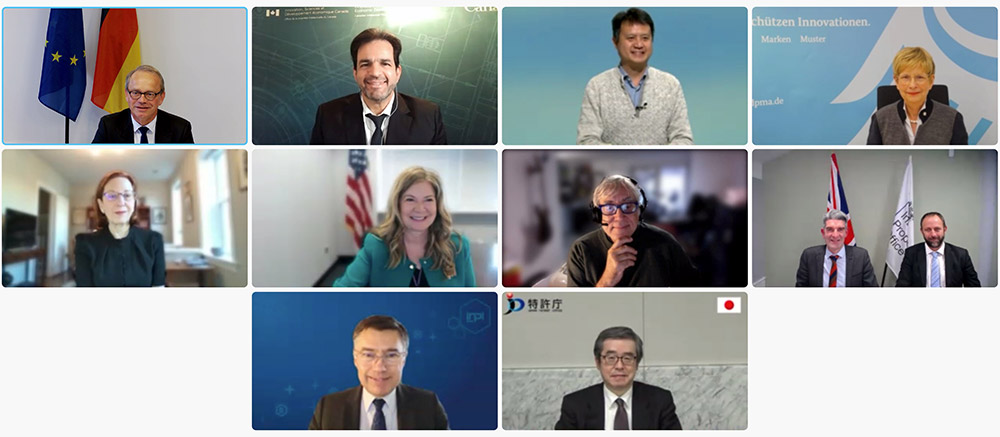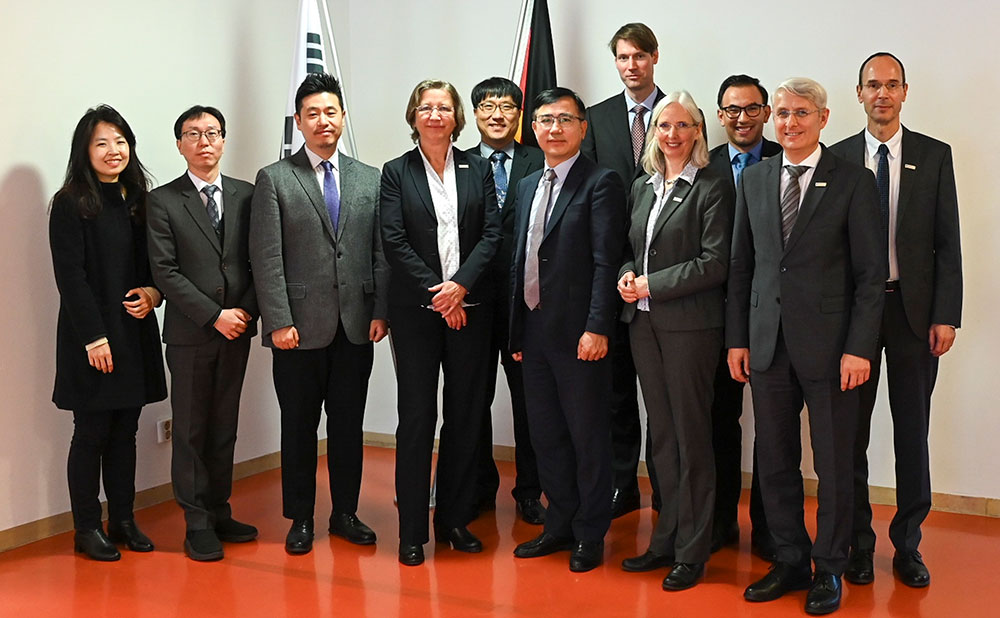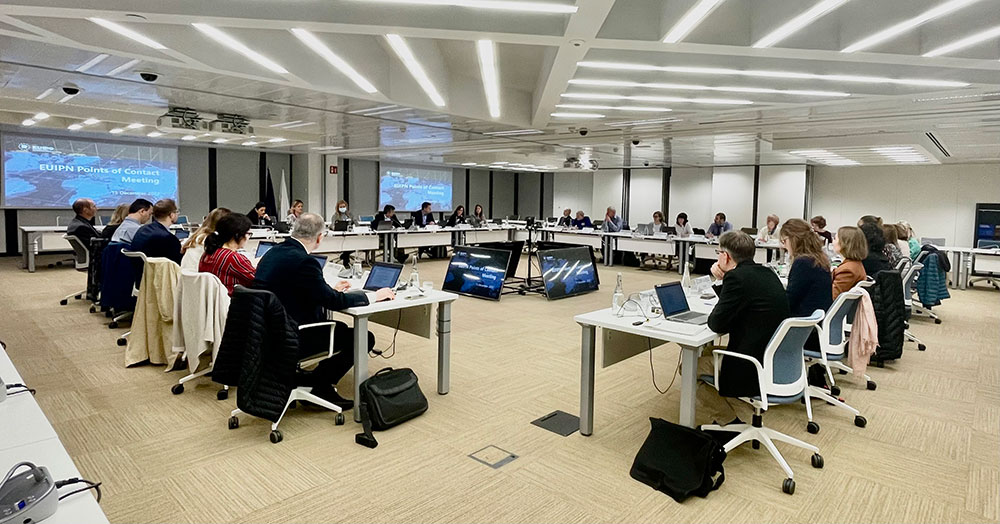In December 2022, the Federal Ministry of Justice, in cooperation with the DPMA, organised a virtual meeting with the Heads of the Intellectual Property Offices of the seven major industrialized countries (G7) as well as the Director General of WIPO.

The participants talked about creating a positive culture for intellectual property and the fight against counterfeiting and product piracy. In a joint declaration, they encouraged all public and private players active in the fight against IP infringements to join efforts. That is the only way to ensure that counterfeiters do not benefit from the new technological developments which make prosecution in cross-border trade even more complicated.
It is necessary to protect intellectual property around the world in order to foster innovation and creativity around the world. That is the only way to protect society against infringements of IP rights and their significant social and economic consequences. The creation of a positive awareness of intellectual property and the fight against counterfeiting and product piracy are equally important.
The Heads of Offices of the G7 States and WIPO agreed to foster the awareness and understanding of the importance of intellectual property in taking up global challenges, such as global health, climate change and sustainable development.
DPMA President Rudloff-Schäffer stressed that this target can only be reached, if the public is informed about and made aware of the positive impact of intellectual property across borders.
The participants agreed that there is a need to develop a strategy for fighting counterfeiting and product piracy. Both are international phenomena requiring an international response. DPMA President Rudloff-Schäffer also highlighted that counterfeit goods put the health and safety of consumers at risk, undermine the rights of employees as well as the reputation of the holders of intellectual property rights and facilitate criminal activity. The rise in counterfeit goods in relation to COVID-19, such as testing sets, protective equipment and vaccines, had shown how counterfeiters implement fraudulent methods in a short time. Strategies for fighting counterfeiting must also be adapted in order to put a stop to such criminal activity. Existing multilateral forums such as WIPO’s Advisory Committee on Enforcement should therefore be expanded.
During a bilateral meeting in January 2022, DPMA President Cornelia Rudloff-Schäffer (retired since February 2023) and Vice-President Bernd Maile briefed Commissioner Kiyoshi Mori and Deputy Commissioner Susumu Iwasaki of the Japan Patent Office (JPO) on the amendments to the German Patent Act and the possible impact of the Unified Patent Court on the national patent system. The heads of the offices highlighted the general need to intensify cooperation on current affairs in commercial legal protection.
Furthermore, the parties compared notes on subjects in an effort to prepare for the meeting of the Heads of Intellectual Property Offices of the seven major industrialized countries (G7).
A high-ranking delegation led by Mr Jisu Kim, Director General for Patents and Utility Models, of the Korean Intellectual Property Office (KIPO) from South Korea visited the DPMA in early December for consultations with the heads of two Directorates General, Dr Maria Skottke-Klein (Patents and Utility Models) and Katharina Mirbt (Administration and Law).

The representatives of both offices exchanged information about the efforts being made in order to ensure and further improve the high quality of patent examination. Both sides agreed that the latter is essential for the acceptance of the IP system.
The delegations also talked about Artificial Intelligence (AI) as well as the current legal framework concerning the protection of AI based inventions. The most important question in this regard is to what extent AI could be considered as a legal entity. Both offices presented a detailed analysis of the applicable law in their respective country and the case law available on the matter so far.
Both delegations also discussed the challenges that the national patent offices are going to be facing in view of the introduction of the Unitary Patent and the Unified Patent Court. Both offices explicitly highlighted the need to regularly keep each other posted on the most current affairs in commercial legal protection. The meeting on the directors’ level was accompanied by two operational level meetings. In addition, the delegation visited the Federal Patent Court, which is also based in Munich.
The Director in charge of international cooperation of the Patent Office of the Republic of Poland, Ms Anna Dachowska, as well as a representative of the Organisation for Economic Cooperation and Development (OECD) also visited the DPMA in July. This study visit was part of an OECD project on the subject of the role of commercial property in fostering innovation in Poland. The European Commission supports that project in an effort to foster structural reforms in order to, for instance, develop a long-term strategy for commercial legal protection in Poland.
The participants took up an intense exchange on the possibilities and tools available to promote the protection of intellectual property in both countries. The DPMA also informed the colleagues from Poland about the extension of tasks according to section 26a of the Patent Act (report on page 37). The DPMA will from now on coordinate programs supporting IP for small and medium-sized enterprises in harmonization with regional, national and international institutions and agents.
Both delegations highlighted the importance of the cooperation between Germany and Poland when it comes to meeting the needs of applicants in both countries as well as the enforcement of IP rights.
For many years, the DPMA has been working in close partnership with the World Intellectual Property Organization (WIPO) in order to implement initiatives to strengthen intellectual property around the world. As part of this cooperation, the General Director of the Albanian Intellectual Property Office Ms Rudina Bollano and her delegation visited the DPMA in Munich in July. During their study visit, which lasted for several days, the guests were given comprehensive insights into the practical processing of the applications for supplementary protection certificates at the DPMA.
The European Union Intellectual Property Office (EUIPO) works with the EU member states’ national Intellectual Property Offices on providing harmonised application procedures for trade marks and designs in Europe. DPMA experts are represented in working groups on convergence projects that work towards harmonising the examination practice of all trade mark offices in the EU. In the course of last year, two working group meetings, each lasting several days, and in which the DPMA participated, were held in an effort to develop a common practice for trade marks applied for in bad faith. Convergence projects already completed in the last years concerned matters including the new forms of trade marks and their examination regarding formal requirements and grounds for refusal (in 2022, the DPMA also organised a webinar on some aspects of this subject in cooperation with the EUIPO), the use of a trade mark in ways differing from the registration and criteria for assessing design disclosure on the internet.
DPMA experts also participate in the evaluation of the efforts made so far to harmonise the practice and in the planning of new convergence projects during a convergence analysis.
In addition, the DPMA contributes to various research and classification tools, including TMClass (single classification database for goods and services) as well as TMView and DesignView (research tools for trade mark and designs).
The European cooperation continues to focus on support for small and medium-sized enterprises (SME) in the effective use of commercial IP rights. The DPMA participates in various projects in that field.


